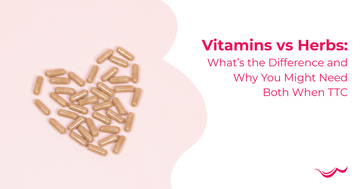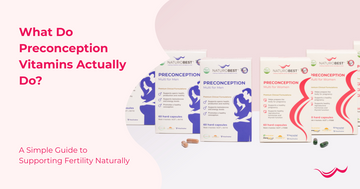
Preconception care has been recognised since the 1970s, and today, its importance is well established in both natural and mainstream medicine. But what does preconception care really involve?
At its core, preconception care is about giving yourself the best possible foundation for a healthy pregnancy. It means improving your diet, lifestyle, and overall wellbeing, because a healthy sperm and a healthy egg create the best chance of a healthy conception and baby.
One of the most important steps in this process is detoxification, supporting your body’s natural ability to clear toxins and restore balance before conception.
A Healthy Body Starts with a Healthy Gut and Liver
A well-functioning digestive system and liver are essential to any detox or preconception plan. Years of processed foods, caffeine, alcohol, or environmental toxins can burden these organs and affect overall health.
Fortunately, the liver is remarkably resilient and capable of regeneration under the right conditions. It’s also responsible for metabolising hormones, making it a key focus during preconception.
Liver-Supportive Herbs
Bupleurum
In Traditional Chinese Medicine, the liver is closely associated with emotional wellbeing, particularly irritability or frustration. Bupleurum helps protect and tone the liver, while also supporting mood balance. It can be very beneficial to reduce irritability associated with premenstrual syndrome (PMS).
Schisandra
This adaptogenic herb supports the liver’s detoxification pathways (phases I and II), enhances resilience to stress, and has a calming effect on the nervous system. It’s particularly useful when oestrogen levels are elevated, as it supports hormonal clearance.
Dandelion Leaf
A natural diuretic and rich in potassium, dandelion leaf helps reduce fluid retention, particularly before menstruation. It’s often used to support gentle detoxification through the kidneys.
Globe Artichoke
Similar to milk thistle, globe artichoke supports liver regeneration without reducing iron levels - an important consideration for women preparing for pregnancy. It’s also beneficial for those experiencing bloating, nausea, or sluggish digestion.
Why Not Milk Thistle?
Although milk thistle is a well-known liver tonic, it can chelate iron which will reduce iron stores. As most women need to build iron levels before pregnancy, it’s best reserved for men or those with iron overload.
Depuratives: Whole-Body Detoxification
Depuratives are herbs that promote the elimination of waste products throughout the body, not just through the liver.
Burdock root is one of the best-known depuratives. It helps clear the skin, supports bowel regularity, and promotes overall detoxification.
Clivers (Cleavers) is another favourite. It supports lymphatic flow, a vital yet often overlooked part of detoxification. The lymphatic system cleanses the body’s tissues, but unlike the circulatory system, it has no pump and can easily become sluggish.
You can help stimulate lymph flow through:
- Exercise
- Dry body brushing
- Massage
These practices not only assist detoxification but may also help reduce the appearance of cellulite.
Testing and Detoxifying from Heavy Metals
A Hair Tissue Mineral Analysis (HTMA) can reveal levels of heavy metals excreted over the past three months, giving an indication of your body’s toxic burden.
If results show elevated metals such as mercury, lead, or cadmium, a qualified practitioner can guide you through a safe detox protocol. This may include high-dose mineral therapy alongside chlorella, a natural detoxifying agent that binds heavy metals and supports bowel and liver health.
If chlorella causes loose stools, simply reduce the dose.
A Healthy Digestive System: The Key to Detoxification
Regular bowel motions are essential for eliminating waste, including excess hormones like oestrogen. When stool remains in the bowel too long, oestrogen can be reabsorbed into the bloodstream, disrupting hormonal balance.
To maintain daily bowel regularity:
- Eat plenty of fibre-rich vegetables
- Stay hydrated (around 2 litres of filtered water daily)
- Exercise regularly
If your bowel remains sluggish, liver-supportive herbs or probiotics may help restore healthy gut function. Discuss probiotic strains and dosages with your naturopath or healthcare practitioner.
Detox Diet: The Foundation of Preconception Health
A detox diet helps reduce toxin exposure while nourishing your body with nutrient-dense foods. It’s ideal to follow a dedicated detox program for at least three weeks before conception, and maintain clean eating throughout your four-month preconception period.
Top Detox Tips
- Start your day with lemon juice in warm water to support liver function.
- Reduce caffeine, if needed, limit yourself to one cup of tea per day.
- Eliminate alcohol, ideally for four months before conception. For men, this means abstaining during the preconception period too. Alcohol negatively affects sperm quality and DNA integrity.
- Switch to organic meat, dairy, fruits, and vegetables where possible. Pesticides often contain xenoestrogens (foreign oestrogen-like compounds) that can disrupt hormonal balance.
- Eat a rainbow of fruits and vegetables every day for antioxidants and phytonutrients.
- Always drink filtered water, ideally from glass or stainless steel, not plastic.
While breaking old habits can be challenging, it typically takes just 21 days to establish new ones. As your energy and wellbeing improve, your motivation to maintain these positive changes will grow.
The Bottom Line
Detoxing prior to conception helps prepare your body for the journey ahead. By supporting your liver, gut, and lymphatic systems, addressing heavy metals, and adopting a clean, nutrient-rich diet, you can enhance fertility and give your baby the best possible start in life.
Even outside of preconception, completing a gentle detox every six months is a valuable step towards better health and vitality.




